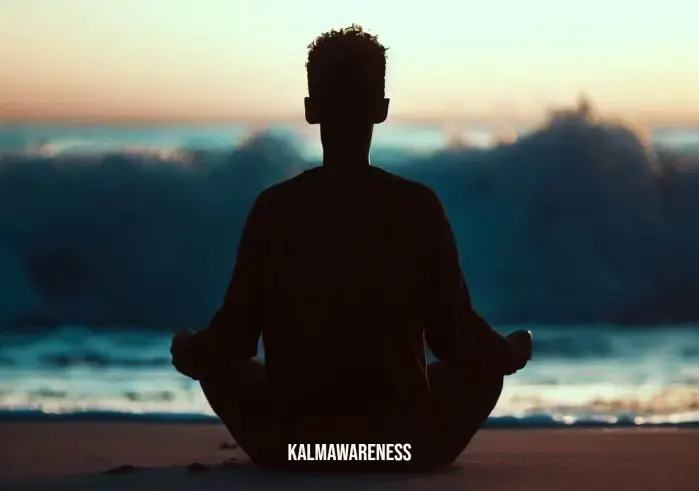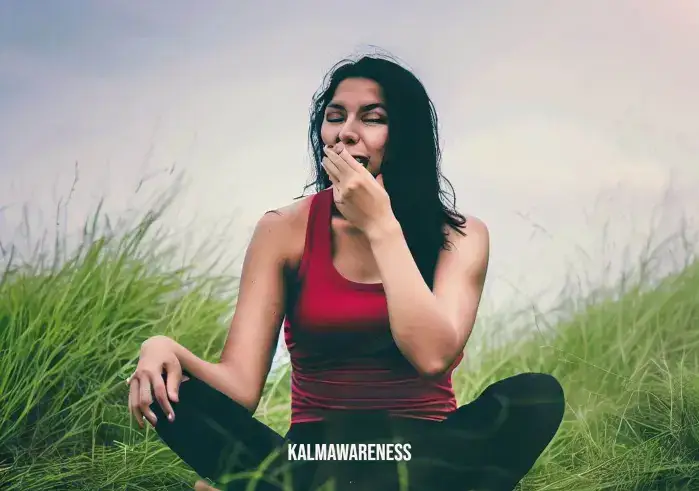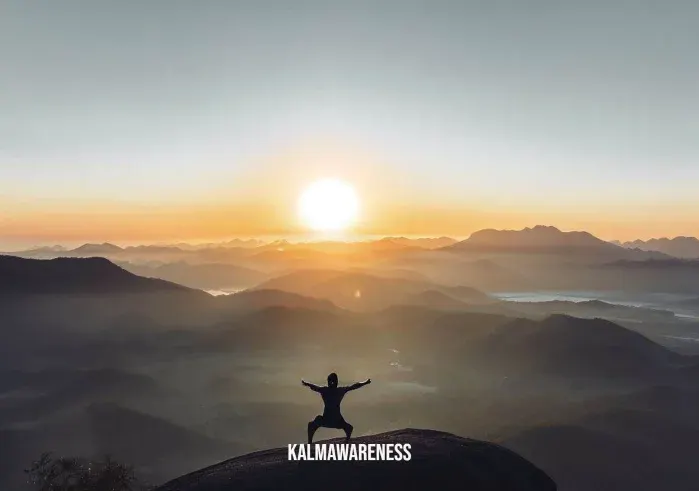Cultivating Mindfulness: A Comprehensive Guide for Young Adults
The transition from adolescence to young adulthood is fraught with numerous challenges. It is during this period that we’re expected to lay a solid foundation for our future and this can lead to enormous stress. Practicing mindfulness for young adults can help in stress management, enhance mental health, promote self-awareness, boost productivity, and improve emotional intelligence. Let’s explore how this can be achieved.
Embrace The Journey: The Art Of Mindfulness
Practicing mindfulness is akin to embarking on a journey. The destination is not the primary focus, but rather the process and what you learn along the way. The art of mindfulness is all about living in the present moment, fully engaged and aware of our thoughts, feelings, and actions without judgment or resistance.
The beauty of mindfulness is that it’s not a one-size-fits-all approach. You can tailor it to suit your lifestyle, whether you’re engaged in physical activities such as yoga and movement, or simply sitting quietly in your living room. Remember, mindfulness is not about striving for perfection but cultivating a greater sense of awareness.
Why Mindfulness Matters
Understanding the relevance of mindfulness in our lives can significantly influence our commitment to practice. The main appeal of mindfulness for young adults lies in its ability to offer effective coping mechanisms for stress and anxiety. These issues have been linked to mental health disorders, and practicing mindfulness can be a preventative measure.
Studies have also highlighted the potential of mindfulness in fostering self-awareness. This practice encourages a deeper exploration of our inner selves, helping us uncover our motivations, values, and patterns of thought. Recognizing these aspects can lead to a greater understanding of one’s self and others, aiding in conflict resolution and better relationships.
How To Start Your Mindfulness Practice
Starting your mindfulness practice might seem daunting, but it doesn’t have to be. Begin by setting aside a specific time each day for your practice. Whether it’s first thing in the morning, during your lunch break, or before bed, consistency is key.
The aim is not to suppress or ignore your thoughts but to acknowledge them and let them pass like clouds in the sky. You can start with guided meditations or simple exercises like focusing on your breath, an object, or a mantra.
Being mindful is more than just meditation. It’s about cultivating awareness in all aspects of your life, from how you eat, how you keep your composure, to how you interact with others and even how you perceive your own thoughts.
The Role Of Mindfulness In Stress Management
The fast-paced nature of our lives often leads to stress, which can have detrimental effects on our overall well-being. Incorporating mindfulness into our routine can serve as a potent stress management tool. It enables us to pause, breathe, and gain perspective on the situations that induce stress.
Through mindfulness, we develop a better understanding of our stress triggers and how we react to them. This increased awareness can then be leveraged to create healthier responses that do not escalate the stress but instead, diffuse it. The end result is an enhanced ability to manage stress and remain composed under pressure.
Having embarked on this mindfulness journey together, I invite you to continue to the next part of this article where we will delve deeper into the benefits of mindfulness for young adults, particularly focusing on mental health and productivity. We’ll also explore common mindfulness techniques and how to incorporate them into your daily life.

Mindfulness: A Gateway to Improved Mental Health and Enhanced Productivity
Undoubtedly, mindfulness for young adults can be a powerful tool for improved mental health and productivity. The way we interact with our thoughts significantly influences our mental health, and by practicing mindfulness, we can learn to relate to our thoughts in healthier ways.
Mental Health Benefits of Mindfulness
An important aspect of mindfulness is non-reactivity, the art of observing our thoughts and feelings without getting swept away by them. For example, if we experience a negative thought, we acknowledge it, understand it’s merely a thought and not a fact, and let it pass. By doing this, we can prevent negative thought patterns from spiraling into stress or anxiety.
Moreover, mindfulness has been proven to play a key role in managing mental health disorders. Mindful techniques, such as focusing on breath or practicing non-reactivity, can be an effective way to alleviate symptoms associated with anxiety and depression. Incorporating mindfulness into therapeutic approaches can lead to mindful mood balance, contributing to better mental health.
Mindfulness and Productivity
When it comes to productivity, mindfulness can be a game-changer. In the hustle of modern life, we’re often multitasking and our attention is divided among various tasks. This can lead to a reduction in the quality of our work and can increase stress. Practicing mindfulness can help us focus on the task at hand, enhancing our efficiency and the quality of our output.
Mindfulness helps create a state of flow, where you’re fully immersed and engaged in a task, leading to increased productivity. It’s an antidote to the constant distractions and interruptions that plague our digital age. Apps designed for personal growth can support you in integrating mindfulness into your daily routine and work life.
Exploring Different Forms of Mindfulness
Mindfulness is a versatile practice and can take on many forms, providing opportunities to tailor it to your preferences. It’s not just about sitting in silence. You can practice mindfulness through various activities such as yoga, mindful eating, or even mindful walking.
A popular mindfulness practice is the body scan technique, which involves paying attention to different parts of the body, from your toes to your head, and noticing any sensations that arise. This practice helps ground us in the present moment and can be a great way to unwind before sleep.
Moreover, young adults can harness the power of mindfulness through mindful learning, an approach that incorporates mindfulness techniques into the learning process, improving focus and comprehension.
Practicing mindfulness in nature, often referred to as forest bathing or eco-therapy, is another excellent way to cultivate mindfulness. The natural environment can have a calming effect, making it easier to focus and be present.
In the next part of the article, we’ll delve into the role of mindfulness in cultivating emotional intelligence and improving self-awareness. We will also explore how mindfulness can help in identifying and aligning with our core values and personal growth. Continue on to learn more about these fascinating aspects of mindfulness practice for young adults.

The Role of Mindfulness in Emotional Intelligence and Self-Awareness
The practice of mindfulness for young adults goes beyond stress management and productivity. It also plays a significant role in fostering emotional intelligence and self-awareness. These qualities are incredibly valuable in both personal growth and professional advancement, making mindfulness a tool for holistic development.
Mindfulness and Emotional Intelligence
Emotional intelligence is the ability to understand, use, and manage our own emotions in positive ways. Through mindfulness, we can improve our emotional intelligence by developing an enhanced ability to perceive and understand our emotions.
Practicing mindful awareness can help us tune into our emotional states and recognise the emotional states of others. This understanding not only helps us navigate our personal emotions but also fosters empathy, improving our interpersonal relationships.
By staying present and being aware of our emotions, we can refrain from reacting impulsively. This state of non-identification with our emotions allows us to respond to situations wisely rather than reacting out of habit or impulse.
Mindfulness and Self-Awareness
The journey towards self-awareness begins with understanding our thoughts, emotions, and behaviours. Mindfulness, by encouraging us to pay attention to our inner world, accelerates this journey.
A mindful assessment of our thoughts and feelings can reveal patterns, giving us insights into our habitual reactions. This self-knowledge can empower us to make changes, leading to personal growth and improved mental health.
Through mindfulness, we can also become more attuned to our physical body. Observing bodily sensations can provide valuable clues about our emotional state. This body-mind connection, often overlooked, can be a powerful source of self-awareness.
Core Values and Mindfulness
Identifying our core values is a crucial part of personal growth. These values guide our behaviour, decisions, and relationships. Mindfulness can support us in aligning our actions with our core values, leading to a more fulfilling life.
By practicing mindfulness, we can learn to listen to our inner voice, which often holds the key to understanding what we truly value. This internal alignment can lead to greater authenticity and improved self-esteem.
Moreover, through mindfulness, we can learn to let go of the societal pressures and expectations that may have influenced our value system. A mindful project of self-exploration can help us rediscover and redefine our personal values.
In the next part of the article, we will explore how mindfulness can aid in personal growth and self-improvement, with a particular focus on the role of mindfulness in behavioural change and its impact on relationships. Continue on to delve deeper into these critical elements of mindfulness practice for young adults.

Mindfulness and Personal Growth for Young Adults
Building on the previous chapters about mindfulness for young adults, let’s delve into its transformative role in personal growth and self-improvement. It’s no exaggeration to say that mindfulness can be a powerful agent for change, especially when it comes to modifying our behaviour and improving relationships.
Mindfulness and Behavioural Changes
Young adulthood is a stage of life where many of our habits and behaviours solidify. These behaviours can either be supportive, driving us towards our goals, or they can be obstructive, holding us back. Mindfulness can be an essential tool in identifying and transforming these behaviours.
By engaging in mindful behavioural solutions, we can become more aware of our actions and reactions, allowing us to recognize those that aren’t serving us well. We can then work on substituting these with more positive behaviours.
A crucial part of this process involves recognizing triggers – circumstances or events that lead us to react in certain ways. Once we can identify these, we can use mindfulness to pause, observe our reaction, and choose a more appropriate response.
Mindfulness also encourages us to practice non-judgmental awareness, which is crucial when working to change behaviours. Rather than beating ourselves up when we revert to old patterns, we can use these moments as opportunities for learning and growth.
Improving Relationships through Mindfulness
Just as mindfulness can transform our relationship with ourselves, it can significantly enhance our relationships with others. One of the most significant gifts mindfulness brings to our interactions is the ability to truly listen.
Practicing mindful listening involves fully focusing on the other person, without interruption or preoccupied thoughts. This level of attention communicates respect and understanding, deepening our connections with others.
Moreover, mindfulness allows us to manage our reactions in interpersonal situations better. By recognising and understanding our emotions, we can respond more thoughtfully, rather than reactively, improving our interactions and relationships.
Mindfulness in Career and Entrepreneurship
In addition to personal growth, mindfulness can have significant benefits for young adults in their professional lives. It promotes qualities like focus, creativity, and resilience, which are highly valued in the workplace.
For those on the path of entrepreneurship, incorporating mindful entrepreneurship can lead to a more sustainable and enjoyable business journey. It helps entrepreneurs maintain their equilibrium amidst the ups and downs of starting and running a business, reducing the risk of burnout.
In the next part of our article, we will explore how mindfulness can influence productivity and self-efficacy. We will also delve into how mindfulness can become a lifelong practice, with benefits extending beyond the young adult years. Continue on to gain more insights into the transformative practice of mindfulness for young adults.

The Ripple Effects of Mindfulness on Productivity and Self-Efficacy
Pivoting from personal growth, we now move to another significant aspect of mindfulness for young adults: its impact on productivity and self-efficacy. Young adults are often in the throes of establishing their careers, pursuing higher education, or even initiating their own enterprises. Navigating these complex and demanding tasks with mindfulness can bring a multitude of benefits.
The Power of Mindful Productivity
In an age where multitasking is glorified, mindfulness stands as a beacon for the effectiveness of single-tasking. A common myth suggests that the ability to juggle multiple tasks simultaneously improves productivity. However, research suggests otherwise, pointing to the power of focusing on one task at a time, a concept often referred to as task shifting.
Through mindfulness, young adults can learn to focus their full attention on the task at hand, undisturbed by distractions or irrelevant thoughts. This kind of presence enhances the quality of work produced, making the individual more productive and efficient.
Mindfulness can also help young adults manage their time more effectively. By being fully present and aware, individuals can more accurately estimate how long tasks will take, prioritize more effectively, and avoid the stress and disappointment that comes from unrealized plans.
Self-Efficacy and Mindfulness
Self-efficacy refers to an individual’s belief in their capacity to execute behaviors necessary to produce specific performance attainments. It reflects confidence in the ability to exert control over one’s motivation, behavior, and social environment. And guess what? Mindfulness can play a pivotal role in boosting this.
By practicing mindfulness, individuals can learn to approach challenges with a non-reactive mindset. Rather than getting caught up in negative self-talk and doubt, mindful individuals can approach difficulties as opportunities to learn and grow.
Mindfulness helps individuals recognize their intrinsic value and capabilities, which can significantly boost self-efficacy. Young adults with high self-efficacy are more likely to set challenging goals, remain resilient in the face of obstacles, and recover more quickly from setbacks.
Mindfulness as a Lifelong Practice
Beyond its immediate benefits, practicing mindfulness can lay the foundation for a lifelong habit that continues to yield benefits long after young adulthood. A year of mindfulness can spark a journey of self-discovery, personal growth, and enhanced well-being that lasts a lifetime.
Embracing mindfulness early on can significantly shape an individual’s life trajectory, infusing it with greater awareness, empathy, resilience, and fulfillment. And the best part? It’s never too late to start.
Stay with us as we delve deeper into the application of mindfulness in everyday activities, including its integration into technology and the digital space. The next chapter will also explore how mindfulness can be a valuable tool for emotional intelligence and managing stress. Continue reading to learn more about the myriad benefits of mindfulness for young adults.

Integrating Mindfulness in the Digital Age and Fostering Emotional Intelligence
In this final chapter, we will explore how mindfulness for young adults can be seamlessly integrated into the digital landscape that has become such an integral part of our daily lives. Moreover, we’ll uncover how mindfulness acts as a catalyst to foster emotional intelligence, an essential trait for managing stress and nurturing personal relationships.
Harnessing Technology for Mindful Living
In the digital age, technology permeates all aspects of life, influencing how young adults learn, work, and connect with others. The potential for distraction is high, with the constant barrage of notifications, emails, and updates. However, by applying mindfulness, young adults can harness technology as a tool for personal growth rather than a source of distraction.
Mindful engagement with technology encourages us to be conscious of how we spend our time online. By being present, we can make intentional choices about what we engage with and for how long, aligning our digital behaviors with our real-life goals and values.
Applications designed to facilitate personal growth are increasingly popular. These apps for personal growth often incorporate elements of mindfulness, helping users cultivate awareness, focus, and emotional balance in their day-to-day lives.
Social media platforms can be seen not merely as entertainment sources but also as spaces for self-reflection. Observing how we react to content can serve as a mirror to our internal states. This concept, the life is a mirror idea, can be a profound mindfulness practice, providing insights into our unconscious biases, emotional triggers, and deeper values.
Emotional Intelligence Through Mindfulness
The cultivation of emotional intelligence is another crucial aspect of mindfulness for young adults. Emotional intelligence refers to the ability to understand, use, and manage your own emotions in positive ways to relieve stress, communicate effectively, empathize with others, overcome challenges, and defuse conflict.
The act of mindfulness, which involves observing our thoughts and feelings without judgment, naturally enhances emotional intelligence. Over time, mindfulness practitioners can develop a deeper understanding of their emotions, enabling them to react to situations with greater emotional wisdom.
The Brene Brown mindfulness approach encourages us to embrace vulnerability and cultivate empathy, key components of emotional intelligence. She emphasizes the importance of recognizing and respecting our own emotions and those of others, a skill that mindfulness helps nurture.
By practicing mindfulness, young adults can foster emotional intelligence, enhancing their interpersonal relationships and enabling them to manage stress more effectively. The mindful mood balance that results can contribute significantly to overall mental health and well-being.
In conclusion, mindfulness for young adults can be a transformative practice, influencing various aspects of their lives from personal growth and productivity to digital engagement and emotional intelligence. This journey of mindfulness, though personal, is also universal, reflecting the shared human experience of seeking awareness, peace, and fulfillment.
Thank you for joining us in this exploration of mindfulness for young adults. We hope that it provides the insights you need to embark on or continue your personal mindfulness journey.





